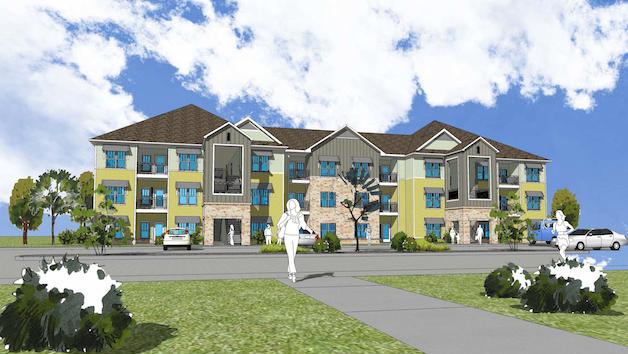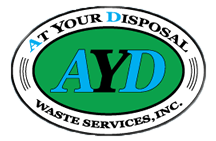At Your Disposal (AYD) Waste Services, an Austin dumpster rental and construction recycling company, is providing waste management for the construction of The Independent, a new highrise that will soon be the tallest residential tower east of the Mississippi. Continue reading “Austin Dumpster Rental Company AYD Waste Services Provides Construction Recycling for Record Breaking High Rise Construction”
Austin Dumpster Rental Company AYD Waste Services Provides Construction Recycling for Record Breaking High Rise Construction
Construction Recycling for New Austin Affordable Housing Complexes

At Your Disposal (AYD) Waste Services is currently providing waste management and construction recycling during the development of two new local apartment complexes. Targeted towards veterans, seniors and low income families, the two complexes will be working closely with the nearby Veterans Administration Outpatient Clinic and key social service agencies in the area. The project is being conducted by the Austin Affordable Housing Corporation (AAHC) to provide more affordable housing options in the area. In order for potential residents to qualify, they must make 60% or less of the median area income, or $51,000 annually.
The two complexes, the Villages at Ben White and the Pointe at Ben White, will be located to the northwest of the Austin-Bergstrom International Airport. Once complete, there will be a combined 443 new apartment units available to local veterans and seniors. The garden-style apartments will be located in three-story buildings spread across a picturesque neighborhood community. Ground broke for the $37.6 million project in September, 2014, and is expected to be completed by December.
A LEED certified project, both the architectural design and the construction process of the Ben White apartments must follow strict guidelines to ensure minimal environmental impact and maximum environmental sustainability. AYD Waste Services is certified by the US Green Building Council to meet LEED standards for construction waste recycling. For the apartment complex development, we are currently providing over 20 40-yard roll off dumpster rentals to recycle construction debris, with more being added to ensure proper recycling. This size dumpster is ideal for accommodating large amounts of typical construction debris, such as drywall, wood scraps, plastic, packing materials, etc. All refuse that is recyclable will be hauled to appropriate recycling facilities for processing and properly documented.
For additional information on construction recycling services from AYD, Waste Services, visit https://aydwaste.com/recycling/. For a free quote, fill out a contact form or call us at 512-272-5400.
AYD Provides Hauling and Recycling for Green Water Redevelopment Project in Austin
A massive redevelopment project is currently underway in an up-and-coming area of Austin, Texas. Complementing the newly constructed Austin Central Library and the redeveloped Seaholm Power Plant, the Thomas C. Green Water Treatment Plant will soon be a bustling mixed-use residential and business complex. AYD Waste will be providing roll-off dumpsters, hauling and recycling services for the redevelopment of the Block 23 segment of the Green Water project. Once completed, this will be a high-rise office complex over 500,000 square feet in size, and almost thirty stories tall.
This project is part of a drastic transformation currently underway in this area of Austin, Texas. What once was an area populated only by utilities and factories will now be an urban live-work-play development, a concept growing in popularity in cities throughout the country. Trammel Crow’s 1.7 million square-foot development will include an upscale high-rise apartment building, a variety of retail establishments, dining options and office buildings. Throughout the duration of the construction process, AYD will be providing 20 yard dumpsters for bulky refuse, such as concrete and metal, as well as 40 yard dumpsters for all other typical debris, such as drywall, wood scraps, packaging, plastics, etc. The development is projected to be completed by November, 2016.
AYD Waste serves residential, commercial and industrial projects throughout Austin, Texas, as well as the surrounding areas. We take pride in being a Leadership in Energy and Environmental Design (LEED) certified waste management company, meeting strict standards for green building practices laid out by the City of Austin Green Building Council. AYD will be hauling refuse and recyclables, taking it to appropriate recycling facilities whenever possible. Unbeknownst to many, over ninety percent of debris is recycled by AYD at a typical construction project. We are very proud to be a part of the redevelopment of the Thomas Co. Green Water Treatment Plant.
Recycling Construction Materials
AYD Waste can typically recycle 98% of construction debris. Unfortunately, it isn’t general knowledge that the majority of construction materials can be recycled. During any major demolition, reconstruction, or new construction project, large amounts of refuse are inevitably generated. However, almost everything from packaging to large chunks of cement can be recycled and cycled back into the economy in a myriad of different shapes and forms, many of which are rather surprising! The green movement has been gaining awareness and support over the past fifty years, and as a result, we are constantly finding new ways to recycle almost anything! But just how is all this junk really used? We’ve come up with an interesting list of reclaimable construction materials and how they are used.
Concrete:
Small fragments of concrete are ground down or crushed for a variety of different purposes. A layer of recycled concrete is laid down before asphalt is spread when making new roads. Often re-paved or improved roadways are made largely of the original concrete road they replace. When ground very finely, it can be used as dry aggregate for new concrete. Larger hunks of concrete are used as riprap, a highly effective method of erosion prevention along waterways.
Asphalt:
The most common use for old asphalt roads and roofing tiles is new asphalt. This is known as Reclaimed Asphalt Pavement (RAP). Recycled asphalt can be used to make warm-mix asphalt, which allows it to be mixed at much lower temperatures, resulting in reduced carbon emissions and energy usage.
Glass:
Did you know that glass is 100% recyclable, and can be recycled endlessly without compromising quality or purity? Furnace ready scrap glass is known as “cullet,” and is used to make new glass for a variety of industrial and consumer purposes. Additionally, scrap glass is used to make fiberglass, which has limitless usage options in and of itself.
Metal:
Most types of metals can be melted and recycled for use in new products. Iron and aluminum are often used to build structures, for automobile parts and aircrafts. New studies show reclaimed metal can be used to detoxify waste water. Recycled metal can be melted at a lower temperature than virgin metals, saving energy and cutting Co2 emissions. Recycled metal is used to make containers, consumer goods, tools, furniture, and more.
Plastics:
There is a vast array of types of plastics, almost all of which can be recycled and repurposed, reducing environmental impact. Plastics are most commonly recycled and formed back into food/beverage containers and packing, but there are endless other applications. Polymers can often be converted into petroleum, to be used for new polymer production, or as fuel. Heat compression allows different types of plastics to be melted down together, for more flexible usage. Plastic PET bottles are currently widely used to produce polyester fabrics, for durable, tough clothing, such as jackets, shoes, or handbags.
Carpeting:
Carpets have even more uses than most people realize; they can be broken down and made into new carpets, and more. At times they become carpet cushion, or plastic-wood composite material frequently used to make furniture such as park benches. Automobile parts frequently contain recycled carpet material. Additionally, it can be used for erosion control as mesh underlayment, sediment control and soil stabilization.
Other materials that can be recycled include insulation, rubber tires, rocks, dirt, sand and cardboard. Recycling is on the rise thanks to increased consumer and industrial awareness. Each year recycling keeps billions of pounds of waste out of landfills, and is continuing to increase and improve each and every day.
Recycling Construction Debris on Building of New Office in West Austin
We’re currently working with general contractor Zapalac/Reed Construction Co. on the construction of a new 250,000 square foot office building in West Austin. We have two 40-yard dumpsters on site to collect debris and we’re providing regular, weekly hauls to recycle the debris.
Part of the San Clemente office and retail park, the new building is located on Westlake Drive on the west side of Capital of Texas Highway. It will be five stories tall and will provide office spaces for local businesses. Spiceworks, a software development company headquartered here in Austin, has already signed on as tenant to lease 95,000 square feet.
The project broke ground in late January of this year and the building is expected to be completed in May 2015. The building also includes a parking lot with 1300 available spaces, and is backed by HPI Real Estate Services & Investments. The building itself was designed by GSC Architects of Austin.
As part of the ongoing initiative to reduce waste in Austin, new construction sites are required to recycle the debris that is generated. We support and take the Zero Waste initiative seriously, which is why we have and maintain a LEED certification. We can provide recycling services to any client, but can also fulfill the requirements of LEED jobs including providing a detailed analysis and breakdown of all materials collected, hauled and recycled.
Recycling is an important part of the construction process. Much of the debris generated on a construction site is similar to common household waste and can easily be recycled and repurposed. These items include glass, plastic, paper and cardboard, metals, and wood. Other construction debris like brick or concrete can be recycled to be reused in paving roadways, preventing erosion or in landscaping. Even dirt can be transported away from an excavation site and re-purposed elsewhere.
If you’re breaking ground on a LEED project in Austin, please contact us to discuss your hauling and recycling needs. We are competitively priced and offer same day delivery service.
Photo credit: GSC Architects
LEED Certification by the Numbers
LEED, short for Leadership in Energy and Environmental Design, is a certification process that was developed by the US Green Building Council (USGBC). There are different types of certifications available for businesses, contractors and construction companies like AYD, homeowners and buildings.
LEED certification is based on a points system and has four certification levels available: certified, silver, gold and platinum. Nine key areas are the focus for determining certification: sustainability, water efficiency, energy and atmosphere, materials and resources, indoor environmental air quality, location and linkages, awareness and education, innovation in design, and regional priority. Points are earned for a variety of actions including using eco-friendly building materials, installing a tankless water heater or using other smart water use and conservation techniques, installing solar panels or cool roofing, using green cleaning materials and recycling.
As of June 2012, two billion square feet of building space was LEED certified. The focus on energy efficiency and sustainability extends to existing buildings, as well. The Empire State Building in NYC received a Gold LEED rating in 2011. It is the tallest and largest LEED certified building in the US!
Buildings in the US typically account for 38% of CO2 emissions and 73% of electricity consumption. Following LEED requirements, however, buildings that are certified often consume 25% less energy and 11% less water. 34% of these buildings actually lower greenhouse gasses and, as of 2011, have diverted over 80 million tons of waste from landfills through waste diversion programs.
We are LEED AP certified. This type of certification is specific to construction and building design. Our certification means that we can participate in the new construction of LEED-certified buildings and jobs that have LEED requirements. One of the main requirements we are able to fulfill for LEED jobs is recycling all discarded construction debris. To meet LEED requirements, we provide a detailed breakdown of all materials hauled and demonstrate the total percentages of debris that are ultimately recycled.
If you are planning a new LEED construction project in Austin, please contact us to discuss your hauling needs.


